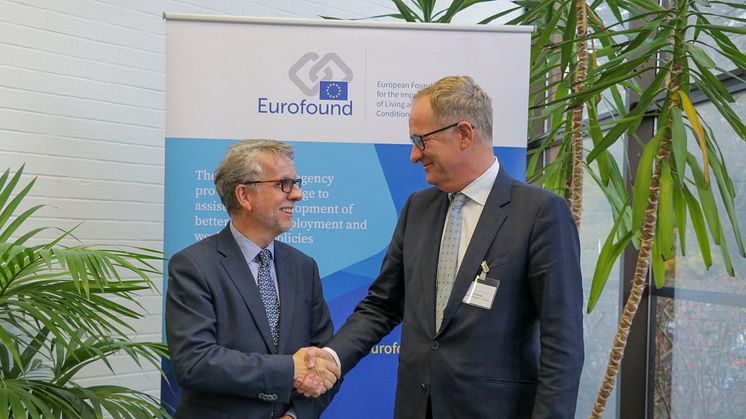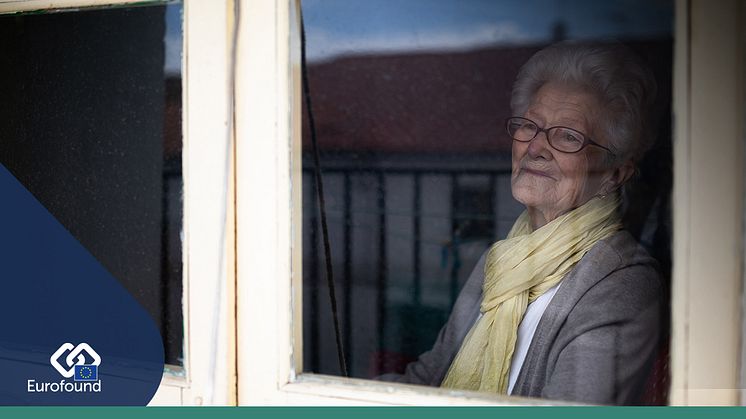
News -
Reflecting on the developments of living and working conditions across the EU over the past decade
You have now completed 10 years at the helm of Eurofound, at the core of living and working developments across the EU. This period has seen many important changes and significant developments in this sphere. It has also spanned some major and unique milestones, including the impact of the Great Recession and the ongoing pandemic.
What have been the major changes you have seen in the area of living and working in Europe during this time?
It has been a turbulent decade indeed. I arrived in the middle of the crisis and at a time when the recovery had not yet fully taken hold in in all countries or across all societal groups. I now leave as Europe faces the myriad of challenges resulting from the pandemic and the economy is experiencing the sharpest drop in GDP since World War II.
Over the past decade, there have not been dramatic changes in the working conditions of those who retained their jobs. Structural change, however, has continued to leave a trail of winners and losers as a result of the changes driven by digitalisation, the transition to a low-carbon economy, globalisation and demography, accelerated during the crisis periods. Unemployment is still probably the single biggest issue and the main driver of inequality, poverty and exclusion. Similarly, the overall reduction and availability in working hours is an issue, as the expansion of part-time work impacted on in-work poverty. The crisis also arrested, and in some cases reversed, the process of convergence regarding wages and social protection. The growing variety of forms of employment, pushed by technology, globalisation and business models, has blurred the borders of traditional employment relations, opening up gaps in social protection and challenging traditional industrial relations. In terms of societal groups, we have witnessed progress in closing some gender gaps – although this progress also has suffered a setback during the pandemic and there is still a long way to go – while young people have been most acutely affected by two major crises in a decade. Beyond employment, the needs of an ageing population and reconciliation of work and life, particularly in relation to care needs, remain highly pertinent challenges.
How do you feel these issues will impact on living and working in Europe in the longer term? Will they dilute our social Europe? Is the convergence machine set to shudder to a permanent standstill?
During the past 10 years, the European Union has seen a rise in divisions and societal tensions, with significant divergences between Member States during the Great Recession, including tensions around wages, contrasting approaches to mobility and migration and a worrying decline of trust in institutions and the EU project, with Brexit perhaps the most visible and dramatic indicator. Rifts between North and South, West and East, creditors and debtors are also still painfully evident.
As the EU’s reaction to the COVID-19 crisis has been much bolder and more determined than its response to the financial crisis, citizens will probably appreciate the benefits of working together. However, the ratification of measures is not yet complete, and clearly the political polarisation does not help.
What mechanisms do you believe have worked in the face of these challenges? Do you think the social model has proved itself to be still fit for purpose during this time?
Europe is still the social benchmark at global level. The social model itself needs to adjust and respond to the challenges, including those related to an ageing population, more diverse employment relations, insecure working lives and faster restructuring processes. It will be important to remain ambitious in terms of the social protection objectives, while at the same time ensuring that problems are not ignored, and the necessary reforms not thwarted.
How do you think the role of the EU Agencies has evolved during this period? Has their contribution proved to be of benefit during these critical times? In what way?
I believe that the EU Agencies continue to be agile institutions capable of delivering a lot with limited resources (indeed considerably reduced over the last decade). The number and scope of Agencies has grown during the decade and, from the perspective of taxpayers, the demand for increased efficiency of the institutional architecture and higher accountability of Agencies is a legitimate one. Agencies should keep their focus on fulfilling their purpose and demonstrate every day that they are worth the investment the society is making in them.
Specifically, what do you think have been Eurofound’s greatest achievements during this time?
Overall, I believe we have succeeded in enhancing our usefulness. We have managed to bring our research closer to the knowledge needs in the policy action arena. Eurofound today is more visible and its expertise is acknowledged and used in most social policy debates at EU level. There is much evidence to support this, from the input of our findings in key policy documents to the requests to contribute to key political events of the EU Institutions. And we have achieved this while also increasing our scientific rigour and efficiency.
What do you think your own contribution has been? Are there regrets?
I think I have been part of that, but I would emphasise that this has been a team achievement.
My contribution focused on being very persistent and consistent in all this, asking stakeholders constantly about their needs, passing on the message in house, providing key guidance when selecting our activities, requesting the flexibility to react to demands, maintaining high standards across the board, and striving to convey to the stakeholders and the broader audience a reliable, credible, balanced and robust image of Eurofound’s work.
On the regrets chapter, when dealing with so many stakeholders, managers and staff…. it is impossible to ensure everyone is satisfied all of the time. I regret the negative impact of some of the decisions taken, even if I remain convinced that those were the right decisions at the time.
The next phase is critical for European social, work and labour related developments – how we will live, how we will work, the Pillar, gender strategy, minimum wage, platform work and so on. Where do you think Eurofound can contribute best?
It is clear we are undergoing the deepest crisis since World War II. But we will also be responding to this with the most intense investment assistance package ever coordinated at EU level. It will be key for Eurofound to fully understand and translate the knowledge needed to inform this massive policy initiative at national level and the support and monitoring required at EU level.
As you start to take a little distance from the Institutions, the Agency and its work, what do you think Eurofound can try to improve over the coming period? How should we seek to shape change?
It will be important to keep the focus on the external demands and requirements and to avoid the unnecessary multiplication of projects and outputs and to integrate our findings better. My advice would be to adopt a ‘digital first’ strategy to explore new and innovative initiatives both to conduct research and to present findings in a way that is searchable and filtered by the user.
What would be your biggest hopes and fears for Europe as you look to the future?
My biggest hope is that we manage to beat the virus and achieve a successful, cohesive recovery across Europe, and indeed the world. There is potentially, in fact a huge opportunity for Europe in this, despite the pain and destruction, to see the results of what we can achieve by working together.
My greatest fear is that increased polarisation, tensions and divisions will undermine trust. That Europeans will fall into the trap of populist narratives focused on identifying ‘us’ and ‘them’ (whether that be countries, groups in society, institutions, etc), exacerbating confrontation where cooperation is needed.








